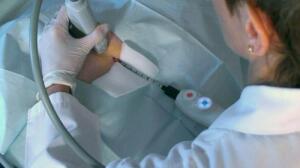by
Lauren Dubinsky, Senior Reporter | October 23, 2014

Courtesy of IceCure Medical, Inc.
IceCure Medical, Inc. announced yesterday that the first two patients involved in a multi-center clinical trial have been successfully treated with their cryoablation technology, IceSense3. The technology is a non-invasive approach to treating breast cancer by using very cold temperatures to destroy the tumors.
The cryoablation procedure is performed in the physician's office and takes about five to 15 minutes. The physician administers local anesthesia and uses ultrasound to guide a small probe into the tumor. Very cold temperatures are then delivered through the probe to ablate the tumor.
The patient doesn't experience any pain during the procedure and since no tissue is removed, there is virtually no scar. Just like with a needle biopsy, the patients can go back to work or resume their normal activities right away.



Ad Statistics
Times Displayed: 137004
Times Visited: 7945 MIT labs, experts in Multi-Vendor component level repair of: MRI Coils, RF amplifiers, Gradient Amplifiers Contrast Media Injectors. System repairs, sub-assembly repairs, component level repairs, refurbish/calibrate. info@mitlabsusa.com/+1 (305) 470-8013
Dr. Lindsey Gold in collaboration with Regional Medical Imaging in Mich. and Dr. Richard Fine with The West Clinic in Tenn. were the first to use the technology on patients this week as part of the clinical trial that is currently underway at 20 sites across the country. The researchers are enlisting and tracking women 65 years and over who were diagnosed with luminal A breast tumors that are smaller than 1.5 centimeters in diameter.
"The treatment of breast cancer has evolved to include not only mastectomy, but also breast-conserving lumpectomy," Gold said in a statement. "Now cryoablation enables treatment of breast cancer without a surgical scalpel or tissue removal, effectively killing the tumor in place. This promises many clinical and quality of life benefits for patients. We hope to prove them in this study."
IceSense3 currently has 510(k) FDA approval for use in general surgery, dermatology, thoracic surgery, gynecology, oncology, proctology and urology.

